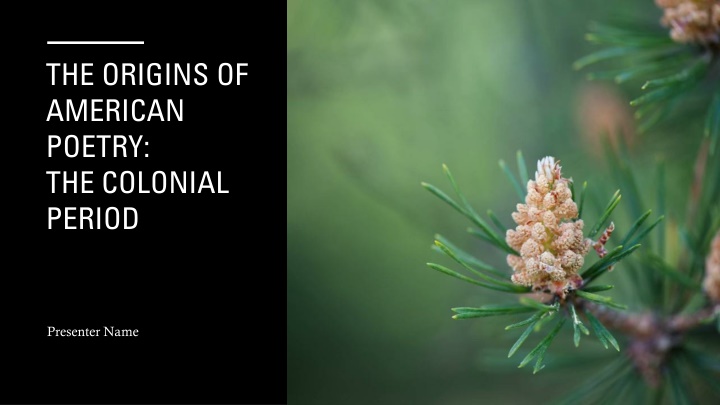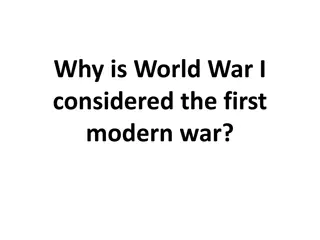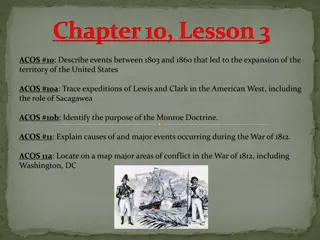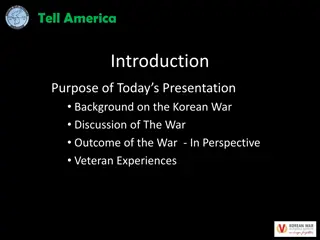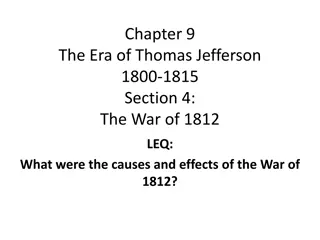World War I: The First Modern Conflict
World War I, considered the inaugural modern war, marked a shift in warfare tactics, technology, and global involvement. Analyze the defining characteristics that classified it as such, shaping the course of future conflicts.
Download Presentation

Please find below an Image/Link to download the presentation.
The content on the website is provided AS IS for your information and personal use only. It may not be sold, licensed, or shared on other websites without obtaining consent from the author.If you encounter any issues during the download, it is possible that the publisher has removed the file from their server.
You are allowed to download the files provided on this website for personal or commercial use, subject to the condition that they are used lawfully. All files are the property of their respective owners.
The content on the website is provided AS IS for your information and personal use only. It may not be sold, licensed, or shared on other websites without obtaining consent from the author.
E N D
Presentation Transcript
THE ORIGINS OF AMERICAN POETRY: THE COLONIAL PERIOD Presenter Name
THE PURITANS November 11, 1620: Mayflower lands on Plymouth Rock November 1621: Thanksgiving European separatism: Pilgrims , the saints , the Elect , the New Israel , the Chosen People Goodie, Goodman American Adam, New Jerusalem, City on a Hill Teleology, predestination, saving grace, typology Puritan work ethic Crafts and education, but also America as the Devil s Territory, the Salem Witch trials (1692-93) Influence practically gone by the start of the 18thcentury No theatre, but journals, letters, memoirs/narratives, religious poetry 2 2/11/20XX
1st American (woman) poet, 1st female writer to be published with The Tenth Muse Lately Sprung Up in America (1650) She and her husband emigrated with John Winthrop s group in America in 1630 (Massachusetts Bay Colony) Educated; her father and husband were among the founders of Harvard; two of her sons graduates Faced starvation, many difficult relocations, her house burning down, the death of her daughter-in-law and three grandchildren, smallpox paralysis, tuberculosis ANNE BRADSTREET (1612-72) Poetry themes: personal, religious, on mortality, on women s worth, on philosophical issues
In Memory of My Dear Grandchild, Elizabeth Bradstreet, Who Deceased August, 1665, Being a Year and a Half Old Farewell dear babe, my heart's too much content, Farewell sweet babe, the pleasure of mine eye, Farewell fair flower that for a space was lent, Then ta'en away unto eternity. Blest babe, why should I once bewail thy fate, Or sigh thy days so soon were terminate, Sith thou art settled in an everlasting state. By nature trees do rot when they are grown, And plums and apples thoroughly ripe do fall, And corn and grass are in their season mown, And time brings down what is both strong and tall. But plants new set to be eradicate, And buds new blown to have so short a date, Is by His hand alone that guides nature and fate.
In Memory of My Dear Grandchild, Elizabeth Bradstreet, Who Deceased August, 1665, Being a Year and a Half Old consolatio Apostrophe, eulogy, Tone Prefiguration of mourning as human fault: too much content ; was lent Form: Variation of 8+6 convention: 7+7 why? the form emphasize the meaning? -why rhyming scheme of same last 3 lines? How does
To My Dear and Loving Husband If ever two were one, then surely we. If ever man were lov'd by wife, then thee. If ever wife was happy in a man, Compare with me, ye women, if you can. I prize thy love more than whole Mines of gold Or all the riches that the East doth hold. My love is such that Rivers cannot quench, Nor ought but love from thee give recompence. Thy love is such I can no way repay. The heavens reward thee manifold, I pray. Then while we live, in love let's so persever That when we live no more, we may live ever. PRESENTATION TITLE
William Shakespeare Shall I compare thee to a summer s day? (Sonnet 18) Edmund Spenser Sonnet LXIIII from Amoretti Comming to kisse her lyps, (such grace I found) Me seemd I smelt a gardin of sweet flowres: that dainty odours from them threw around for damzels fit to decke their louers bowres. Her lips did smell lyke vnto Gillyflowers, her ruddy cheekes lyke vnto Roses red: her snowy browes lyke budded Bellamoures, her louely eyes lyke Pincks but newly spred, Her goodly bosome lyke a Strawberry bed, her neck lyke to a bounch of Cullambynes: her brest lyke lillyes, ere theyr leaues be shed, her nipples lyke yong blossomd Iessemynes: Such fragrant flowres doe giue most odorous smell, but her sweet odour did them all excell. Shall I compare thee to a summer s day? Thou art more lovely and more temperate. Rough winds do shake the darling buds of May, And summer s lease hath all too short a date. Sometime too hot the eye of heaven shines, And often is his gold complexion dimmed; And every fair from fair sometime declines, By chance, or nature s changing course, untrimmed; But thy eternal summer shall not fade, Nor lose possession of that fair thou ow st, Nor shall death brag thou wand'rest in his shade, When in eternal lines to Time thou grow'st. So long as men can breathe, or eyes can see, So long lives this, and this gives life to thee. PRESENTATION TITLE
-Puritan appropriation of Elizabethan sonnet convention: woman woos man model of feminine virtue, not sin form/rhyme reflecting theme typology: heavenly over earthly love, but latter leads to former (C/c Plato s Symposium) opposite of carpe diem ; promise of immortality not through art
First African-American woman poet published (1773) Brought as slave to America in 1761 (named after her slave ship); the Wheatleys classically educated her and nurtured her talent; success tour in the UK; liberated, but poverty, her husband s imprisonment, deaths of all her 3 children and illness lead her to an early death. Themes: elegies, classical, religious ideals -values, freedom Problem of Uncle Tomism (alienated race consciousness): was it compliance, or minority abolitionist rhetoric politics? 9 PRESENTATION TITLE 2/11/20XX
PHILLIS WHEATLEY (1753-1784) First African-American woman poet published (1773) Brought as slave to America in 1761 (named after her slave ship); the Wheatleys classically educated her and nurtured her talent; success tour in the UK; liberated, but poverty, her husband s imprisonment, deaths of all her 3 children and illness lead her to an early death. Themes: elegies, classical, religious ideals -values, freedom Problem of Uncle Tomism (alienated race consciousness): was it compliance, or minority abolitionist rhetoric politics?
ON BEING BROUGHT FROM AFRICA TO AMERICA 'Twas mercy brought me from my Pagan land, Taught my benighted soul to understand That there's a God, that there's a Saviour too: Once I redemption neither sought nor knew. Some view our sable race with scornful eye, "Their colour is a diabolic die." Remember, Christians, Negros, black as Cain, May be refin'd, and join th' angelic train. Self-deprecating description of black race why? Ambiguous vocabulary (not seeking redemption) Irony ( mercy ; Christians ) 11
